Meta: A proclamation of love to Gabrielle Haller
Title A proclamation of love to Gabrielle Haller
Type Meta
Fandom Marvel (Uncanny X-Men, New Mutants)
Spoilers Issues discussed are Uncanny X-Men #161, 200, 320-321, X-Men #40-41, New Mutants #1, 26-29, Magneto Rex #1-3 and X-Force #14, but there are little to no spoilers for the overall plots, with the exception of New Mutants #26-29.
Warnings Some discussion of genocide and rape.
Characters Gabrielle Haller, Charles Xavier, David Haller, a bit of Magneto (for good measure).
Words 4345
Summary In which I explain why Gabrielle Haller is one of my favourite characters in the X-Men comics. Includes feminist rants, a little bit of slash-goggling and plenty of pictures, so if you’re on dial-up, beware. All bits of comics are transcribed.
Everyone gets defensive about their favourite character at some point or another. It happens to me from time to time, especially in reference to one specific character. It’s difficult to have a favourite Marvel character, as there are so many, but one character whom I’m especially fond of is Gabrielle Haller. She is really just a supporting character, but despite only turning up in a dozen-or-so issues, she is still a distinct, interesting character. I also find her a good example of a female supporting character, who is allowed her own personality despite her connections to (more prominent) male characters. She is also an interesting example of character development. When she first turns up, she is very much “the girl”, but Chris Claremont, who was writing at the time, keeps bringing her back and continues to consider various questions raised during her first appearance.
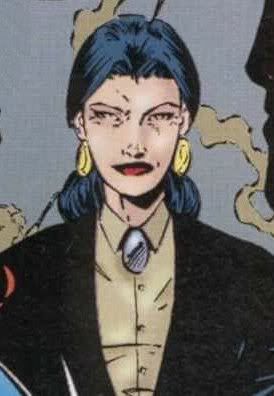
Before I start working my way through (most of) the issues where she appears, it seems only right to introduce her properly. Gabrielle Haller (also called Gaby - I’m going to call her that because it’s by far the easiest, even if it feels a little lacking in respect) is the Israeli ambassador to Britain, and later she is the ambassador to the United Nations. She is also active within politics (she is the Israeli foreign minister at one point) and has a degree in law. Originally, she is from Holland, but ended up in Israel after the Second World War. Her family died in the Holocaust. She survived, but retreated into a state of catatonia, which she only recovered from with the help of Charles Xavier. Gaby is also the mother of Xavier’s son David, who is a very powerful but mentally unstable mutant (and I’ll spend more time discussing their relationship below). One might think that this connection to one of the most prominent X-Men characters would reduce her to the role of ex-girlfriend and mother, but she also appears as a character in her own right.
Let’s start from the beginning. Gabrielle Haller first turns up in Uncanny X-Men #161, which is a flashback, probably to the 1960s. Xavier (young and still uninjured) has been travelling around the Mediterranean, brooding over the fact that Moira, whom he was engaged to, has broken up with him quite suddenly. In Uncanny X-Men #117, which narrates his adventures in Cairo, he says that he “went a little crazy”. The flashback of #161 starts with Xavier arriving to Haifa to help a friend of his, Daniel Shomron, with traumatised Holocaust survivors. Magneto (then known as Magnus) is a medical volunteer at the hospital. The first patient is Gabrielle Haller, who suffers from catatonic schizophrenia, shielding her completely from the world. Xavier attempts to help her telepathically. What follows is in my opinion one of the best-written telepathy sequences in the comics.
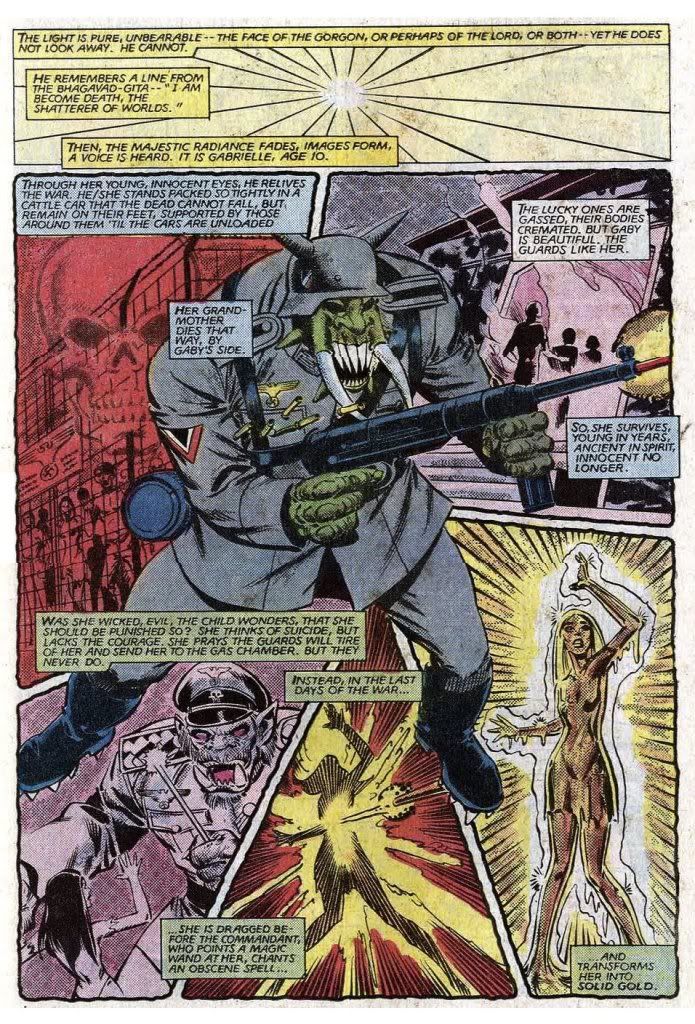
The light is pure, unbearable - - the face of the Gorgon, or perhaps of the Lord, or both -- yet he does not look away. He cannot.
He remembers a line from the Bhagavad-Gita -- “I am become Death, the Shatterer of Worlds.”
Then, the majestic radiance fades, imagines form, a voice is heard. It is Gabrielle, age 10.
Through her young, innocent eyes, he relives the war. He/she stands packed so tightly in a cattle car that the dead cannot fall, but remain on their feet, supported by those around them ‘til the cars are unloaded.
Her grandmother dies that way, by Gaby’s side.
The lucky ones are gassed, their bodies cremated. But Gaby is beautiful. The guards like her.
So, she survives, young in years, ancient in spirit, innocent no longer.
Was she wicked, evil, the child wonders, that she should be punished so? She thinks of suicide, but lacks the courage. She prays the guards will tire of her and send her to the gas chamber. But they never do.
Instead, in the last days of the war...
...She is dragged before the commandant, who points a magic wand at her, chants an obscene spell...
...and transforms her into solid gold.
(Uncanny X-Men #161)
In this sequence, Claremont manages to describe the workings of a child’s mind. The depiction of soldiers as monsters is not an attempt to dehumanise the perpetrators, but a way of underlining the subjective nature of the ten-year-old Gaby’s memories. This distance also lets Claremont be subtle about what precisely happens. This is not just for the sake of any younger readers (although I certainly wouldn’t put this sequence in the hands of a ten-year-old to read), but also about the Comics Code, which states that “rape shall never be shown or suggested”. In the 80s, the Comic Code was not followed quite as rigorously as before, and I’ve found nothing implying that this issue got into trouble. However, they would not have been able to get away with handling this bluntly, with or without a code to follow. (It’s been pointed out, for examples by our friends over at TV Tropes, that rape can sometimes be the default “tragic backstory” for female characters. I’d like to argue, though, that this is not such a case. When done badly, rape as a backstory is trivialised and then scooted to the side quickly, or it is sensationalised and (in the worst-case scenario) presented in an almost voyeuristic way. None of these things happen here. This is part of a greater trauma, and is certainly not trivialised. The distance the subjective narrative gives us takes away any sensationalism - indeed, I find that one sentence, “but Gaby is beautiful” absolutely horrifying. It is also something that in the historical context is plausible, horrific as that is. And, as we will see, it is nothing that comes to define Gaby as a character.
Moving on - after this telepathic sequence, Gaby is roused from her catatonic state and wakes up. She is still weak, but slowly starts putting herself together again. It is through helping her do that that Magnus and Xavier become friends (so if you feel like turning the idea of female characters being dependent on male ones, one could ask how Earth-616 (that is, the primary comic canon) would have looked if it were not for her).
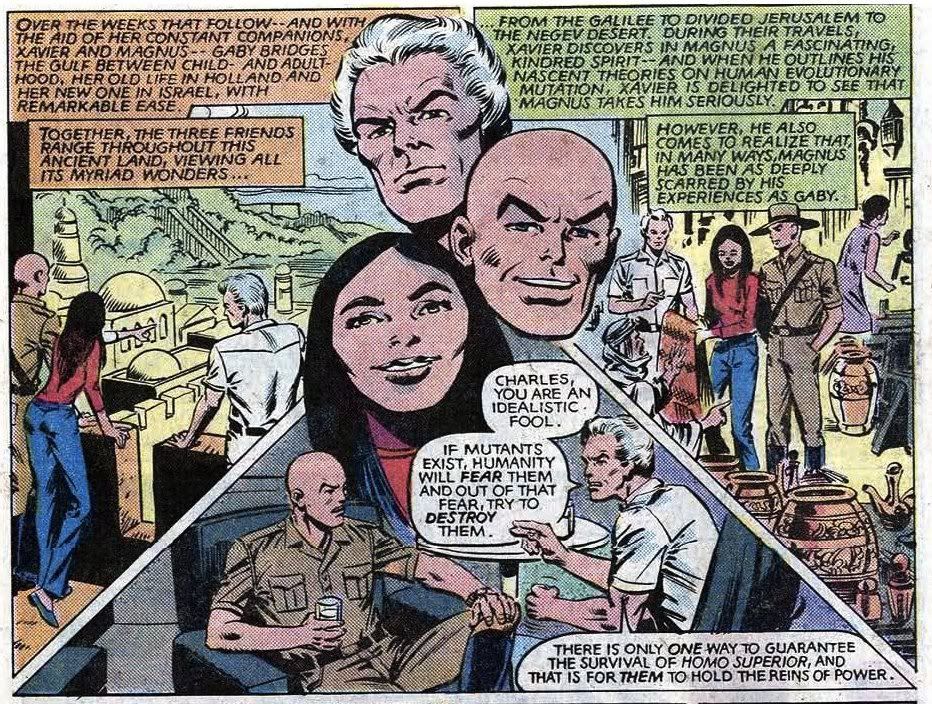
Over the weeks that follow -- and with the aid of her constant companions, Xavier and Magnus -- Gaby bridges the gulf between child- and adulthood, her old life in Holland and her new one in Israel, with remarkable ease.
Together the three friends range throughout the ancient land, viewing all its myriad wonders...
...from the Galilee to divided Jersualem to the Negev Desert. During their travels, Xavier discovers in Magnus a fascinating, kindred spirit -- and when he outlines he nascent theories on human evolutionary mutation, Xavier is delighted to see that Magnus takes him seriously.
However, he also comes to realize that, in many ways, Magnus has been as deeply scarred by his experiences as Gaby.
Magnus Charles, you are an idealistic fool. If mutants exist, humanity will fear them and out of that fear, try to destroy them. There is only one way to guarantee the survival of homo superior, and that is for them to hold the reins of power.
(Uncanny X-Men #161)
(And I must admit that one of the reason why I added this sequence was that I think that the three of them are absolutely adorable together.)
After this montage of the three of them travelling around Israel, the turning-point in Gaby and Xavier’s relationship comes.

Xavier (Magnus is wrong. Such security cannot be imposed by fear from above. It must row from understanding...
Gaby Ahem!
Xavier Hmh? Oh, I’m sorry, Gaby. My mind was wandering.
Gaby Then I’ll have to use all my feminine wiles...
... to attract its attention.
Xavier (Ahhh, Gaby, you believe you’re in love with me.
But you aren’t. Not really. Na yet, your need to love and be loved... is as genuine, as great, as my own.)
Gaby I owe you everything, dear Charles. But I have no means of repaying you...
... save this.
Xavier (I should not do this. But if it makes us both happy and brings us the solace we seek...
...what then is the harm?)
(Uncanny X-Men #161)
What, indeed? Not only is Xavier breaking a convention so ancient that it is mentioned in the first Hippocratic Oath, namely that a doctor should not have any kind of sexual relations with a patient. He makes no attempt to reject the idea that she should ‘repay’ him, not even that she should do so with her body. Warning-bells should be going off here, Charley. Evidently, this is something Claremont did not consider at the time, or (quite possibly) did not have time to elaborate on (after these panels, the plot picks up again, and Gaby and Charles are not reunited until the very end of the issue, when Magnus leaves them to take up his fight against human hegemony). The issue about the morality of their relationship and the question of consent comes up several times later. In Legion Quest (Uncanny X-Men #320-321 and X-Men #40-41), Magnus expresses serious doubts about the propriety of it.

Haifa...
...The past.
Magnus (Charles, what are you getting yourself into?
You let the barriers between the doctor/patient relationship slip.
You let Gabrielle Haller fall in love with you. But who am I to criticize? Is it jealousy? That he has Gaby - - and each night I go to sleep and dream of my lost beloved, Magda?
Why would I deny Charles a chance at happiness just because I refuse to dream of a better world?)
(X-Men #40)
In this entire arc, the idea of mutation as a metaphor for homosexuality is constantly present - in X-Men #40, Magnus reflects on how he should confide in Charles, and thinks to himself: “Why is it that every time I look into that man’s eyes -- he makes me feel as though I’m guilty of something? Of what, though? You know the truth, Eric [sic]. Guilty of hiding. Of running away from the responsibilities you bear because you are different.” In the same issue, there is a mention of Xavier’s “suspicions about his friend Magnus” and that he might be like him. Even if both these mentions are references to mutations, neither of the statements need any altering to be about homosexuality. Slash-goggles are particularly difficult to prize off, and therefore this point is highly subjective, but I can’t resist reading Magnus’ worries over Xavier’s relationship with Gaby as being not so much because of jealousy of what he has, as what she does. But I digress.
However, later on when Xavier admits his worry that “ethical doctors don’t fall in love with their patients”, Magnus (despite his previous reservations, which still seem to linger, considering how grim he looks in these panels) encourages him, answering that “Gabrielle Haller isn’t a case file, Charles. She’s a marvelous woman, alive and radiant.” After mentioning that he knows what she must have lived through (an arguable point?), he continues:

Magnus I know the emptiness and loss she must have felt. She does not want to be alone in this world.
Xavier So if Gabrielle is my last chance at happiness...
Magnus ..You would be a fool to let her slip away. Life is short, Charles.
(Uncanny X-Men #321)
Here is the implication that Xavier’s motives aren’t precisely easy. If Gaby is simply his “last chance at happiness”, she is certainly not his first choice, and it is a chance that he seems to take almost dutifully. Neither Gaby nor Charles are the other’s great love. They are simply two people who in a specific situation, at a specific time, end up needing each other.
To return to the first kiss between Gaby and Xavier in #161, let us consider Xavier’s thoughts: “You believe you’re in love with me. But you aren’t. Not really.” To deal with two points first - Gaby has spent most of her life, and until very recently her entire adolescence and adulthood, withdrawn from the world. Her conception of adult relationships is bound to be a little patchy. Also, Xavier is a telepath. However, neither of these things change the fact that this is an incredibly infantilising comment. Who is he to tell her how she feels? But Xavier’s certainty that he knows what Gaby feels better than Gaby continues. I think this is a conscious decision on Claremont’s side (at least one formed after #161). The fact that he writes Gaby as arguing back shows that he has thought about it. However, Xavier is still very sanctimonious about it, and engages in what must be the opposite of slut-shaming. He is desperate to keep Gaby as a victim, arguing that what he did to her was essentially rape, even if she does not agree on that. It is an attempt to infantilise her, but also to take away her right of a sexuality of her own. This question is especially address in Excalibur #14, during a psychic battle when Xavier is separated from Doctor Strange and finds himself meeting Gaby.
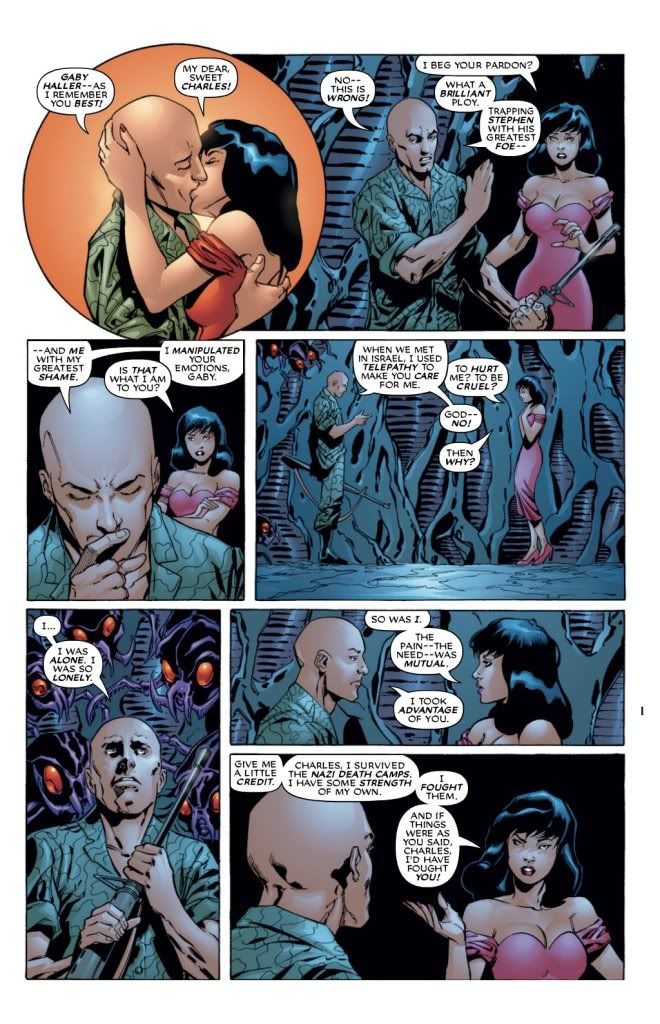
Charles Gaby Haller - - as I remember you best!
Gaby My dear, sweet, Charles!
Charles No - - this is wrong!
Gaby I beg your pardon
Charles What a brilliant ploy. Trapping Stephen with his greatest foe --
-- and me with my greatest shame.
Gaby Is that what I a to you?
Charles I manipulated your emotions, Gaby.
When we met in Israel, I used telepathy to make you care for me.
Gaby To hurt me? To be cruel?
Charles God - - no!
Gaby Then why?
Charles I...
... I was alone. I was so lonely.
Gaby So was I.
The pain - - the need - - was mutual.
Charles I took advantage of you.
Gaby Give me a little credit. Charles, I survived the Nazi death camps. I have some strength of my own. I fought them. And if things were as you said, Charles, I’d have fought you!
(Excalibur #14)
The suggestion that Xavier actually manipulates her feelings rather than just overstep the boundary between doctor and patient does not quite make sense with the evidence provided in #161, but comic canon is not a clear-set thing. On the other hand, he might be lying, to make his guilt more perceptible (but his anger when Gaby implies that the confrontation is not only an illusion, which is so palpable that he raises a fist against her, implies that this is something he would not actually have told her). It is quite interesting that he keeps pushing the point that he is the one who essentially started their entire relationship and that he is to blame, and she tells him quite bluntly that he’s wrong. She refuses to be kept as a victim. Also, she refuses to accept Xavier’s fishing for sympathy. She is not afraid to stand up to him.
This question of blame is also addressed in Excalibur. Gaby asks Xavier whether he has ever manipulated someone the way he did with her.
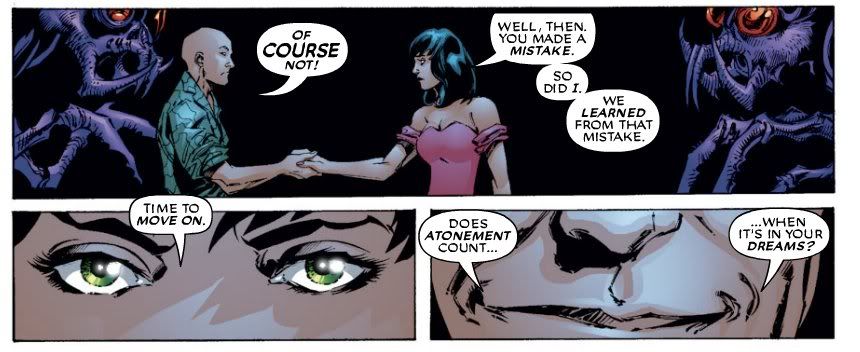
Xavier Of course not!
Gaby Well, then. You made a mistake. So did I. We learned from that mistake.
Time to move on.
Xavier Does atonement count...
...When it’s in your dreams?
(Excalibur #14)
I won’t go into the main plot of #161, but will simply say that Gaby is central to it. At the end of the issue, Magneto takes off with some Nazi gold and Gaby regains her (once again lost) sanity, this time on her own, even if Xavier is part of it. The flashback ends with a kiss, and Gaby proclaiming, “it’s so wonderful to be alive!” After this, we hear nothing of her until twenty years later.
However, before moving onto that, it seems only fair to discuss Gaby’s cameo in What if Magneto had Founded the X-Men with Professor X?, which is based on the events at the end of #161. What really changes the course of history in this alternative version is that Gaby regained consciousness earlier and argues against Magneto, just after he has his falling-out with Xavier. As a Holocaust survivor, Gaby has some insight into what he has been through, but as a human, her perspective is also different. Magnus might be able to tell Xavier that he is wrong because he doesn’t know anything about real oppression, but he can’t say this to Gaby. The moment which changes it (and the moment which made me certain that I loved Gaby as a character) is this:
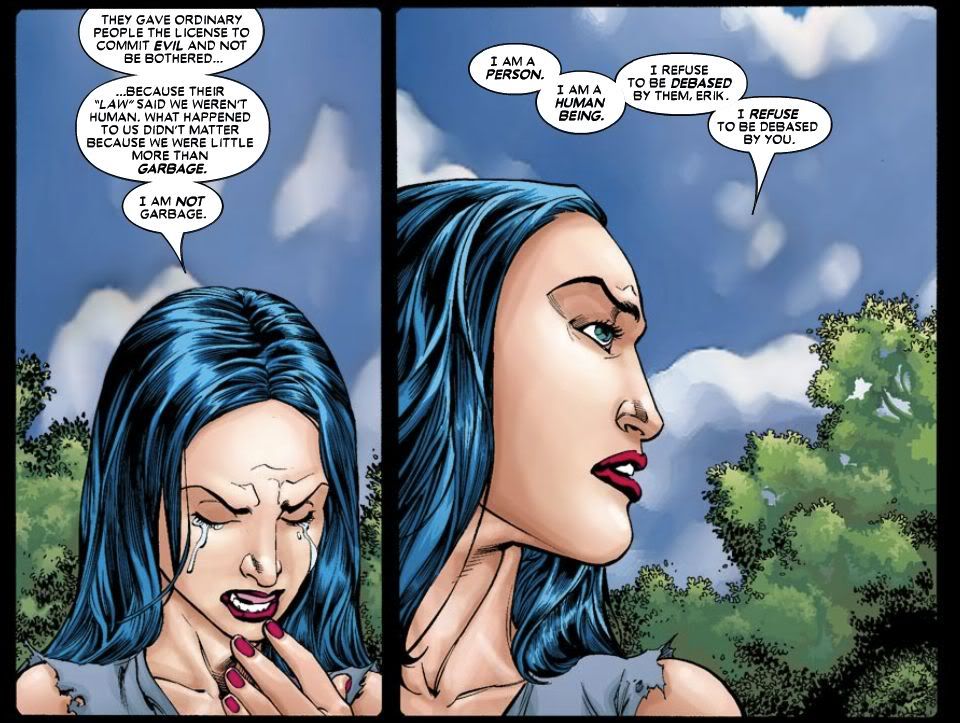
Gaby They gave ordinary people the license to commit evil and not be bothered...
...Because their “law” said we weren’t human. What happened to us didn’t matter because we were little more than garbage.
I am not garbage.
I am a person.
I am a human being.
I refuse to be debased by them, Erik.
I refuse to be debased by you.
(What if Magneto had Founded the X-Men with Professor X?)
Certainly not someone who is daunted by authority, considering that she is ready to argue against both Xavier and Magneto, both of whom are powerful mutants and physically big men. She has a very strong sense of right, and she’ll hold people to it.
A little confusingly, in this alternative universe Gaby ends up married to Magneto. I expect that this is actually a marriage of convenience, because I suppose having two bachelors founding a superhero group together must mean they’re gay... I think Marvel’s reluctance to let Jewish and non-Jewish characters marry (most obvious in the case of Magda and Magneto - this is one of the reasons why Marvel tried to retcon Magneto’s Jewish identity) is the reason why Magneto ends up marrying Xavier’s girlfriend. She doesn’t turn up after this scene, which I think is a pity, but the only way of somehow reading an attraction between them in this very short issue, is that Magneto is impressed by how she argues against him.
Back to canon chronology. Uncanny X-Men #161 was published in 1982. The next year, 1983, a new comic entitled New Mutants, about a new team of mutants (you wouldn’t have guessed, would you?) collected by Xavier. In the very first issue, Moira McTaggert is summoned to the Israeli Embassy in London, and who is the ambassador, if not Gabrielle Haller? This is certainly a big step since last time we saw her, but certainly not an insurmountable one. I’m not going to go into the slightly unrealistic features of this, such as that she is a politician and a diplomat, and all this with a history of psychosis, because bringing the concept of realism into Marvel just doesn’t work. After all, people shooting laser out of their eyes is not altogether realistic.
This quite short scene starts the story of Legion. After a while, it is revealed that Ambassador Haller has an autistic son, and she wants Moira to help him.
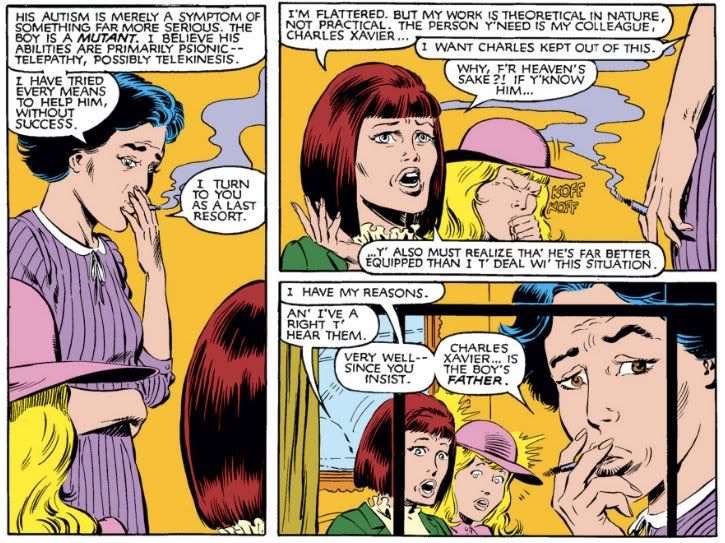
Gaby His autism is merely a symptom of something far more serious. The boy is a mutant. I believe his abilities are primarily psionic - telepathy, possibly telekinesis.
I have tried every means to help him, without success.
I turn to you as a last resort.
Moira I’m flattered. But my work is theoretical in nature, not practical. The person y’need is my colleague, Charles Xavier...
Gaby I want Charles kept out of this.
Moira Why, f’r Heaven’s sake? If y’know him...
...y’ also must realize tha’ he’s far better equipped than I t’deal wi’ this situation.
Gaby I have my reasons.
Moira An’ I’ve a right t’ hear them.
Gaby Very well -- since you insist.
Charles Xavier... is the boy’s father.
(New Mutants #1)
It’s interesting that despite all the male characters floating around here (David Haller, Xavier), the way Gaby is introduced is as the Israeli ambassador of Great Britain. This is a pretty powerful position, and that a woman holds it is particularly impressive. Women are still massively underrepresented in diplomacy, and this is written and set in the 1980s. Also, the big revelation here is not that Gaby is Xavier’s old girlfriend, but that Xavier has a son.
Legion is properly introduced in New Mutants #26-29, published in 1985. As this meta post is about Gabrielle Haller and not her son, I’m not going to go into depth and try not to spoil too much of the plot. Moira has tried everything she can think of to help David, and now she and Gaby have decided to call in Xavier. He comes to Muir Island along with the New Mutants. He has not met Gaby for almost twenty years. Their first proper conversation goes like this:
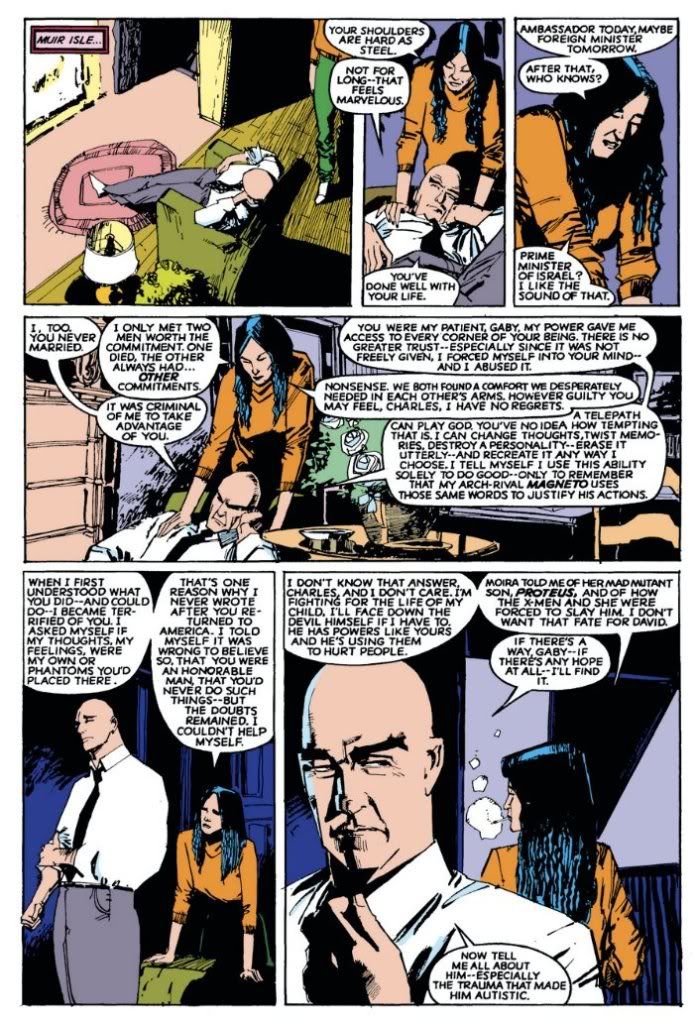
Muir Isle...
Gaby Your shoulders are hard as steel.
Xavier Not for long -- that feels marvelous.
You’ve done well with your life.
Gaby Ambassador today, maybe foreign minister tomorrow. After that, who knows?
Prime minister of Israel? I like the sound of that.
Xavier I, too. You never married.
Gaby I only met two men worth the commitment. One died, the other always had... other commitments.
Xavier It was criminal of me to take advantage of you.
You were my patient, Gaby, my power gave me access to every corner of your being. There is no greater trust -- especially since it was not freely given, I forced myself into your mind -- and I abused it.
Gaby Nonsense. We both found a comfort we desperately needed in each other’s arms. However guilty you may feel, Charles, I have no regrets.
Xavier A telepath can play God. You’ve no idea how tempting that is. I can change thoughts, twist memories, destroy a personality -- erase it utterly -- and recreate it any way I choose. I tell myself I use my ability solely to do good -- only to remind myself that my arch-rival Magneto uses those same words to justify his actions.
Gaby When I first understood what you did -- and could do -- I became terrified of you. I asked myself if my thoughts, my feelings, were my own or phantoms you’d placed there.
That’s one reason why I never wrote after you returned to America. I told myself that it was wrong to believe so, that you were an honourable man, that you’d never do such things -- but the doubts remained. I couldn’t help myself.
I don’t know that answer, Charles, and I don’t care. I’m fighting for the life of my child, I’ll face down the Devil himself if I have to. He has powers like yours and he’s using them to hurt people.
Moira told me of her mad mutant son, Proteus, and of how the X-Men and she were forced to slay him. I don’t that fate for David.
Xavier If there’s a way, Gaby -- if there’s any hope at all -- I’ll find it.
Now tell me all about him -- especially the trauma that made him autistic.
One thing I find Claremont writes particularly well is the way ex-lovers interact. These people know each other well, and there is an intimacy, both in the way they speak and in the way they happily touch. However, they do not fall into each other’s arms. Never in the interaction between these two set after that twenty-year gap is there any romantic tension between them, which to me feels very realistic. I’m also very fond of this scene because of how well-balanced the conversation is. It is not the man talking at the woman, as some conversations in comics are. In fact, Gaby more or less presents more personality traits on this one page than in the whole of Uncanny X-Men #161. First and foremost, she’s presented as a person with a diplomatic and political career. Only after that does the conversation move onto her marital status and their past relationship. The way she admits her fears about the possibility that Xavier has manipulated her, and her fierce worry for David, makes the portrait incredibly human.
Xavier’s claims that what he did to her was “criminal” is probably the inspiration of their discussion in Excalibur #14, with the difference that in that, he admits to having manipulated Gaby’s feelings, which he does not say or even imply here. Claremont diverges from in some other respects from the canon he’s set up in this issue. He adds as a reason why Gaby did not get in touch with Xavier after David’s birth when she heard that he had been paralysed, which, despite certainly being ableist, is something which feels very correct for the time-period. Claremont also attempts to change some details, specifically that Gaby is actually not single but married Daniel Shomron, a friend of Xavier and another of her doctors, who is the man she mentions who died. I don’t really see why Claremont introduces this. I’d like to think it’s a concession to how difficult a diplomatic career would have been for an unmarried single mother in the 60s-70s, or possibly so that Gaby gets to have a bit of a sex life after her silly American boyfriend leaves, but it might be that, well, Gaby’s a woman, Dan’s a man, they’re friends, then they should be married. (Considering that this is in direct contradiction to what’s said in New Mutants, I personally prefer to turn a blind eye on it.)
Back on Muir Island, nothing goes as planned, of course. Gaby doesn’t tell Xavier “everything”, especially not that he is in fact his son (because apparently it’s possible to be a prominent geneticist and a brilliant scientist, and still not be able to count someone’s age minus nine months and realise that he was in a relationship with said person’s mother at that time). Before Xavier can help David in any way, he, the New Mutants, Moira and Gaby all get sucked into David’s mindscape, where David has sealed himself off and his multiple personalities control one mutant power each; the American adventurer Jack Wayne is telekinetic, the tomboy Cyndi controls fire and the young Palestinian Jemail (whom Gaby refers to as “the Arab”) is telepathic.
Finally, Gaby is forced to explain (after Dany, the leader of the New Mutants, has thrown a tantrum at her):
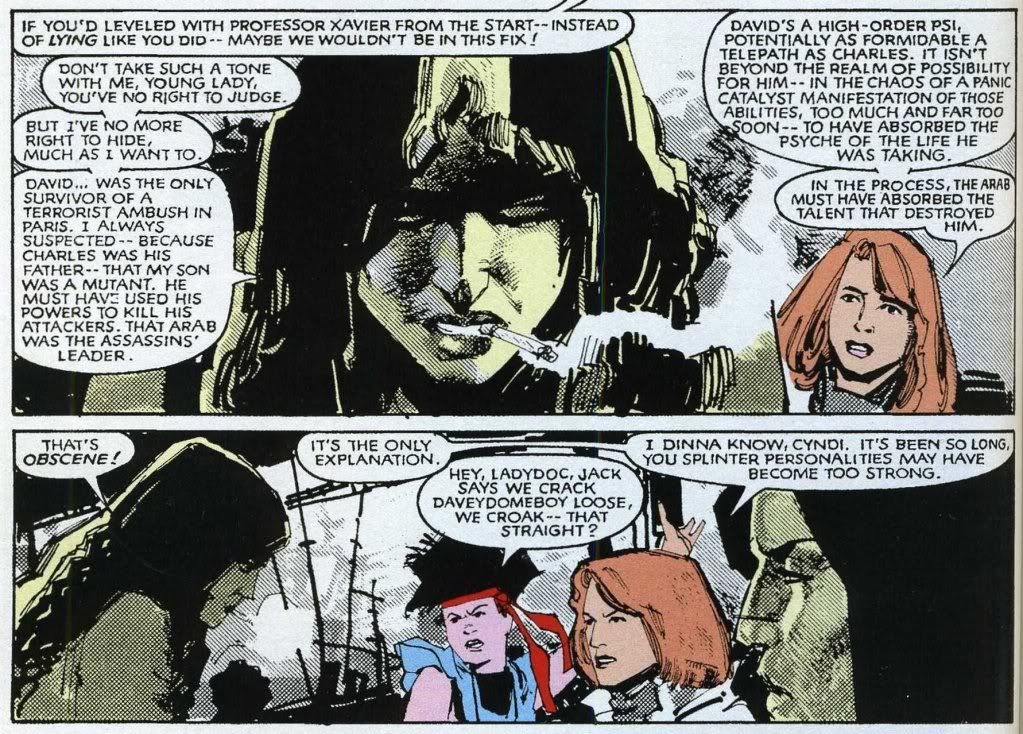
Dany If you’d leveled with Professor Xavier from the start -- instead of lying like you did -- maybe we wouldn’t be in this fix!
Gaby Don’t take that tone with me, young lady, you’ve o right to judge. But I’ve o more right to hide, much as I want to.
David... was the only survivor of a terrorist ambush in Paris. I always suspected -- because Charles was his father -- that my son was a mutant. He must have used his powers to kill his attackers. That Arab was the assassin’s leader.
Moira David’s a high-order psi, potentially as formidable a telepath as Charles. It isn’t beyond the realm of possibility for him -- in the chaos of a panic catalyst manifestation of these abilities, too much and far too soon -- to have absorbed the psyche of the life he was taking. In the process, the Arab must have absorbed the talent that destroyed him.
Gaby That’s obscene!
Moira It’s the only explanation.
Cyndi Hey, ladydoc, Jack says we crack Daveydomeboy loose, we croak -- that straight?
Moira I dinna know, Cyndi. It’s been so long, you splinter personalities may have become too strong.
(New Mutants #28)
Jemail is the most important of the personalities, and he also adds a political side to the story. For most of the story, the reader and the characters are lead to believe that he, who attempted to kill David, is the villain. Especially Gaby is convinced of this, so much that she several times tries to attack him, and when she finally experiences David’s memories of the terrorist attack, she does attack him.
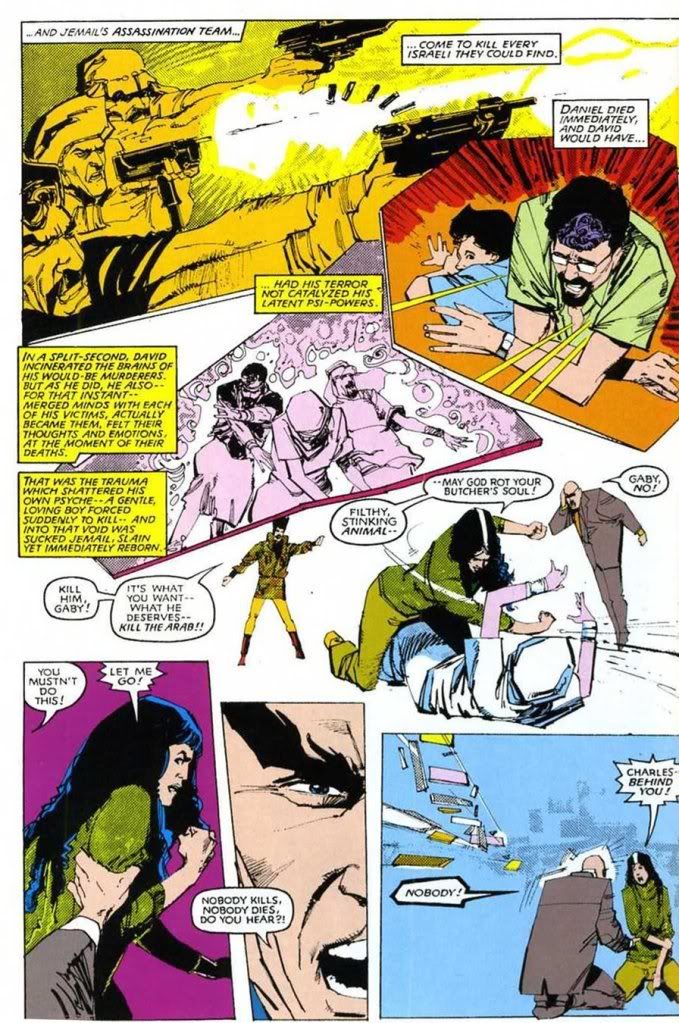
...And Jemail’s assassination team...
...come to kill every Israeli they could find.
Daniel died immediately, and David would have...
...had his terror not catalyzed his latent psi-powers.
In a split-second, David incinerated the brains of his would-be murderers. But as he did, he also -- for that instant -- merged minds with each of his victims, actually became them, felt their thoughts and emotions, at the moment of their deaths.
That was the trauma which shattered his own psyche - a gentle, loving boy forced suddenly to kill -- and into that void was sucked Jemail, slain yet immediately reborn.
Jack Wayne Kill him, Gaby! It’s what you want -- what he deserves -- kill the Arab!
Gaby Filthy, stinking animal -- may God rot your butcher’s soul!
Xavier Gaby, no!
You mustn’t do this!
Gaby Let me go!
Xavier Nobody kills, nobody dies, do you hear me?
Nobody!
Gaby Charles - behind you!”
(New Mutants #29)
This is an altogether more unpleasant side of Gaby, which we have not seen before, but which I think is incredibly important to her character. There is the risk that alongside Magneto, Gaby becomes “the survivor who got it right”, as she seems in the What if...? issue she appears in. Instead, she also harbours irrational (but common) hatreds, while at the same time, she is ready to resort to violence to protect or avenge people she loves.
Events take an unexpected turn, when it turns out that Jemail is not at all trying to splinter David’s mind, but instead put it back together again. He explains how he has been taught to hate Israelis, but when he finds himself possessing David’d telepathic abilities, his host’s mind is the first he reads. “I learned how kind and gentle and innocent a soul he was”, Jemail explains. “Then, I explored his mother’s thoughts, and those of others, and with that knowledge came an understanding, a growing enlightenment of spirit that my hatred could not withstand.” This is an enlightenment which spreads to Gaby while he speaks:
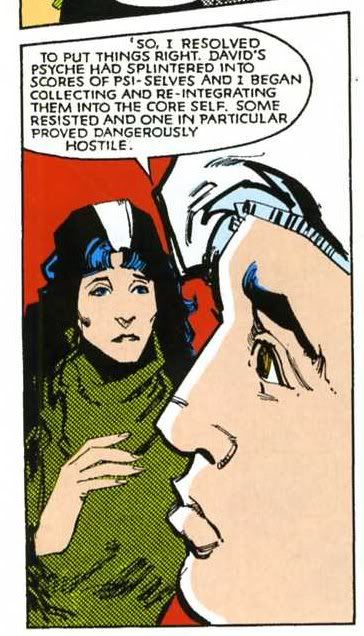
Jemail So, I resolved to put things right. David’s psyche had splintered into scores of psi-selves and I began collecting and re-integrating them into the core self. Some resisted and one in particular proved dangerously hostile.
(New Mutants #29)
This is one of my favourite comic panels in any categories, because it manages to capture something going on which is not being spoken. The look on Gaby’s face is one of guilt and humility, but also tenderness. Her hand is half stretched out, as if she instinctively wants to touch Jemail, now that she realises that he has tried to protect her son, not harm him - in some way he has become her son, as David himself is unreachable - even if she self-consciously seems to stop herself. In some small way, these two characters resolve their hate for one another, which is symbolic for the hopeful outcome of the Israel/Palestine conflict.
Finally, Gaby and the others manage to get out of David’s mind, but are unable to heal it, and his multiple personalities are the only way to communicate with him. The issue ends with another tender moment between his parents:
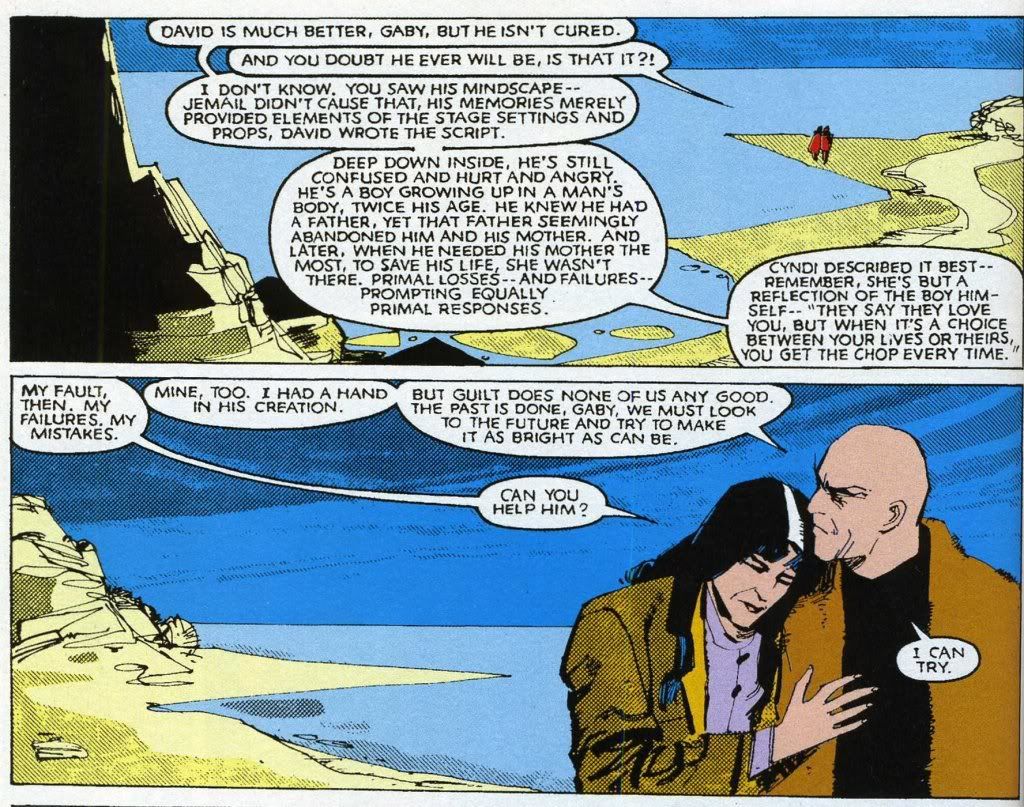
Xavier David is much better, Gaby, but he isn’t cured.
Gaby And you doubt he ever will be, is that it?!
Xavier I don’t know. You saw his mindscape -- Jemail didn’t cause that, his memories memory provided elements of the stage settings and props, David wrote the script.
Deep down inside, he’s still confused and hurt and angry. He’s a boy growing up in a man’s body, twice his age. He knew he had a father, yet that father seemingly abandoned him and his mother. And later, when he needed his mother the most, to save his life, she wasn’t there. Primal losses -- and failures -- prompting equally primal responses.
Cyndi described it best -- remember, she’s but a reflection of the boy himself -- “they say that they love you, but when it’s a choice between your lives or theirs, you get the chop every time.”
Gaby My fault, then. My failures. My mistakes.
Xavier Mine, too. I had a hand in his creation.
But guilt does none of us any good. The past is done,Gaby, we must look to the future and try to make it as bright as can be.
Gaby Can you help him?
Xavier I can try.
(New Mutants #29)
It would be very easy for the narrator and the characters to put all the blame on Gaby, in the way that mental issues are often blamed on mothers. Instead, Claremont makes it more complicated. His father carries some of the blame, as does the situation. David becomes an extension of his parents’ mistakes and traumas (it must be a conscious decision that both Gaby and David suffer from severe traumas prompted by anti-Semitism when they’re ten years old and both react by becoming catatonic). Legion returns several times, most prominently in the prelude to Age of Apocalypse, and even if it would be possible to read him simply as ‘evil’, he rather seems like a deeply tragic character, who is shaped by circumstances, not bad parenting.
New Mutants #29, the last issue in this story arc, was published in July 1985. In December the same year, Uncanny X-Men #200, entitled “Trial of Magneto”, came out. The background is that Magneto, who has gone good, has been arrested, and stands trial in Paris on charges of crimes against humanity. I don’t think you’ll be surprised at who’s the defense.
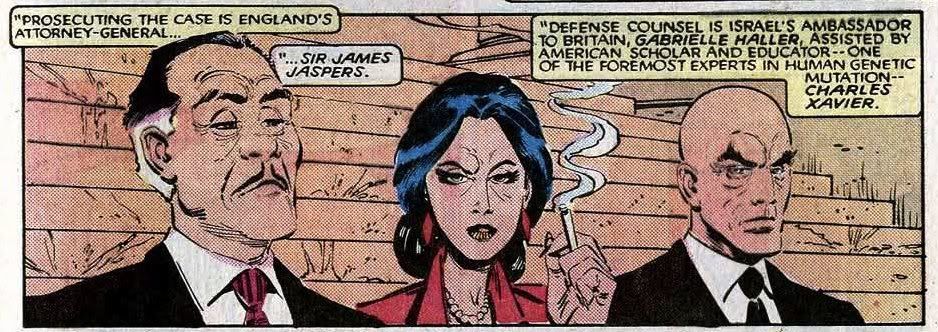
Prosecuting the case is England’s attorney-general...
....Sir James Jaspers.
defense counsel is Israel’s ambassador to Britain, Gabrielle Haller, assisted by American scholar and educator -- one of the foremost experts in human genetic mutation -- Charles Xavier.
(Uncanny X-Men #200)
She’s a multitalented lady. One of the many brilliant things with this issue is that she is only there in the capacity of Magneto’s lawyer. She is never reduced to Xavier’s ex-girlfriend. There is not even any mention of David in this. However, she is still given a lot of personality.
(And as you might have gathered from the artwork by now, Gaby is a chain-smoker. It was fine to smoke in court in the 80s, I guess.)
As this is the kind of issue which makes me jump at people and should ‘you must read it!’, I’m not going to give too much away. However, I give you some of my favourite moments.
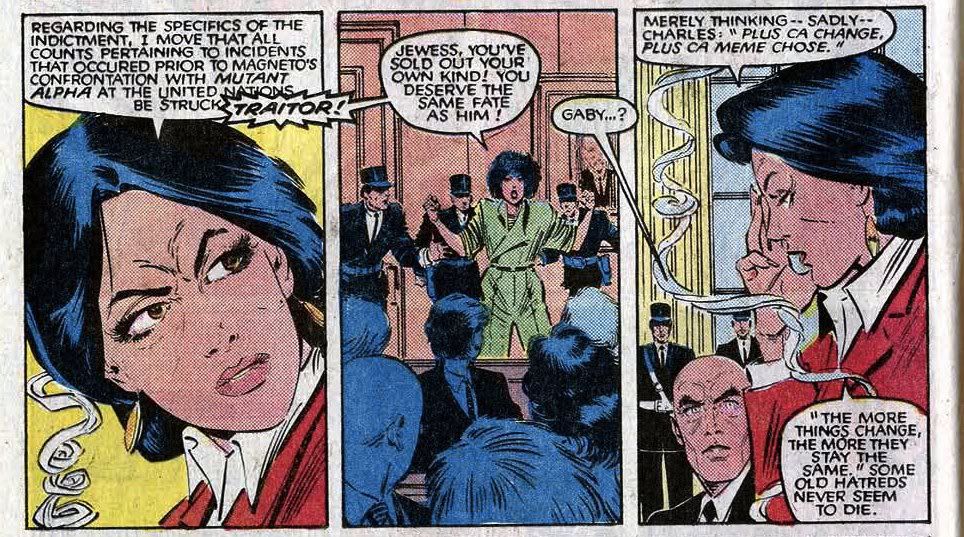
Gaby Regarding the specifics of the indictment, I move that all counts pertaining to incidents that occurred prior to Magneto’s confrontation with Mutant Alpha at the United nations be struck...
Woman in audience TRAITOR!
Jewess, you’ve sold out your own kin! You deserve the same fate as him!
Xavier Gaby...?
Gaby Merely thinking -- sadly -- Charles: “Plus ca [sic] change, plus ca [sic] meme chose.”
“The more things change, the more they stay the same. Some old hatreds never seem to die.”
(Uncanny X-Men #200)
In many ways, this is a quite sad moment, considering the mere fact that anyone would still shout something like that at her, and that she bears it so stoically. Then again, she’s taught herself not to let it get to her. It’s certainly an event which fits in the subject of this issue and the X-Men in general, namely prejudice and oppression. It recurs later, when she, Xavier and Kitty Pryde get attacked by the protestors outside the court, when she is attacked not just for being Jewish but also for being a woman. (Pointed brackets is Marvel’s way of showing that something is in another language than English.)
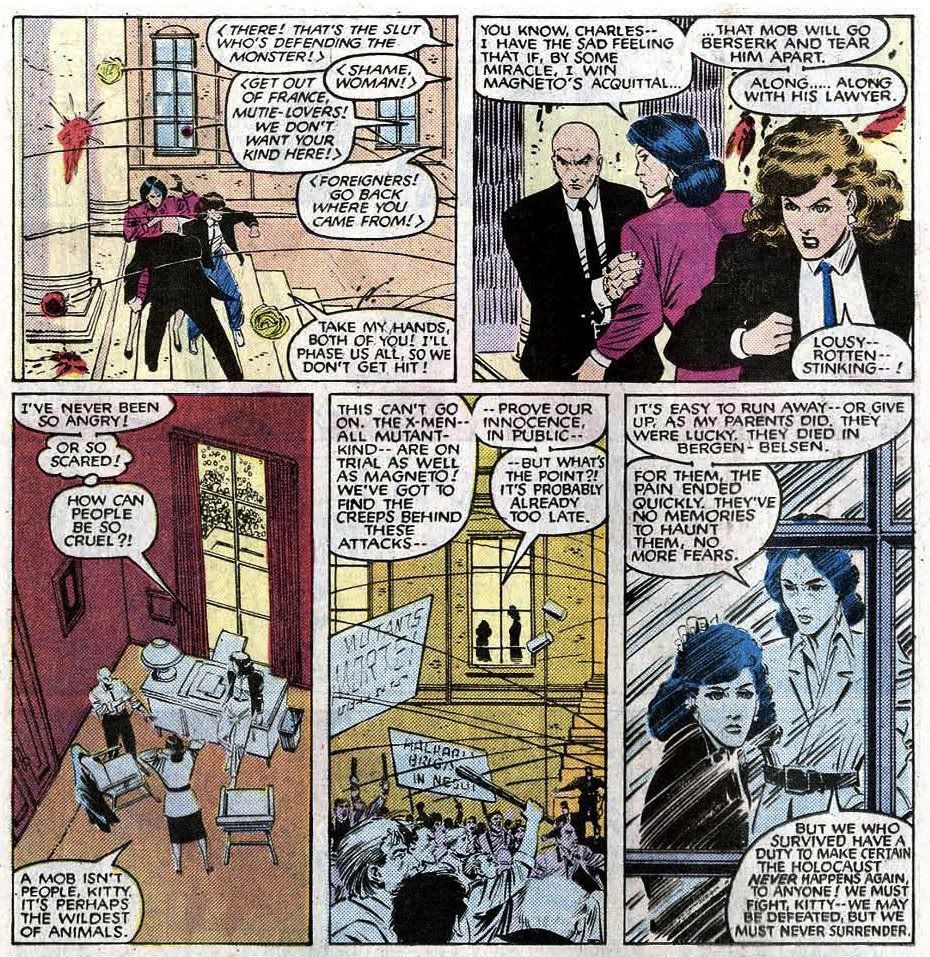
Protestors < There! That’s the slut who’s defending the monster! >
< Shame, woman! >
< Get out of France, mutie-lovers! We don’t want your kind here! >
< Foreigners! Go back where you came from! >
Kitty Take my hands, both of you! I’ll phase us all, so we don’t get hit!
Gaby You know, Charles -- I have the sad feeling that if, by some miracle, I win Magneto’s acquittal...
...that mob will go berserk and tear him apart.
Along... along with his lawyer.
Kitty Lousy -- rotten -- stinking--!
I’ve never been so angry!
(Or so scared!)
How can people be so cruel?!
Gaby A mob isn’t people, Kitty. It’s perhaps the wildest of animals.
Kitty This can’t go on. The X-Men -- and mutant-kind -- are on trial as well as Magneto! We’ve got to find the creeps behind these attacks --
---prove our innocence, in public --
--but what’s the point?! It’s probably already too late.
Gaby It’s easy to run away -- or give up, as my parents did. They were lucky. They died in Bergen-Belsen.
For them, the pain ended quickly They’ve no memories to haunt them, no more fears.
But we who survived have a duty to make certain the Holocaust never happens again, to anyone! We must fight, Kitty -- we may be defeated, but we must never surrender.
(Uncanny X-Men #200)
Gabrielle Haller has turned up several times since this, primarily in Legion Quest (and X-Factor #108-109, set just before this arc) where Legion plays an important role. By virtue of her status as a diplomat and politician, she’s there both as David’s mother and as someone in a position of authority. For example, when the army is considering dropping a nuclear bomb on Legion to stop him, she makes pretty clear that she is not letting that happening:
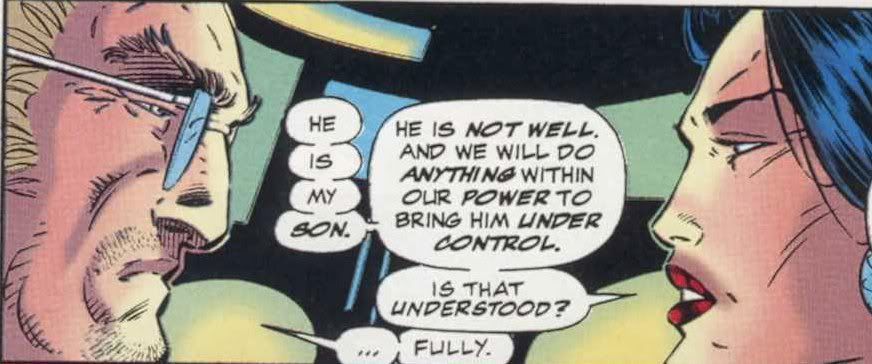
Gaby He
is
my
son.
He is not well. And we will do anything within our power to bring him under control
Is that understood?
Hessen ...
Fully.
(Uncanny X-Men #320)
She also turns up several times in later issues, in which she is Israel’s ambassador to the United Nations. In Magneto Rex, a three-issue comic published in 1999, she turns up in all three issues. In the first issue, she and several others, for example Captain America and Moira McTaggert, are interviewed about the situation in Genosha, a country that Magneto has claimed as a mutant homeland.
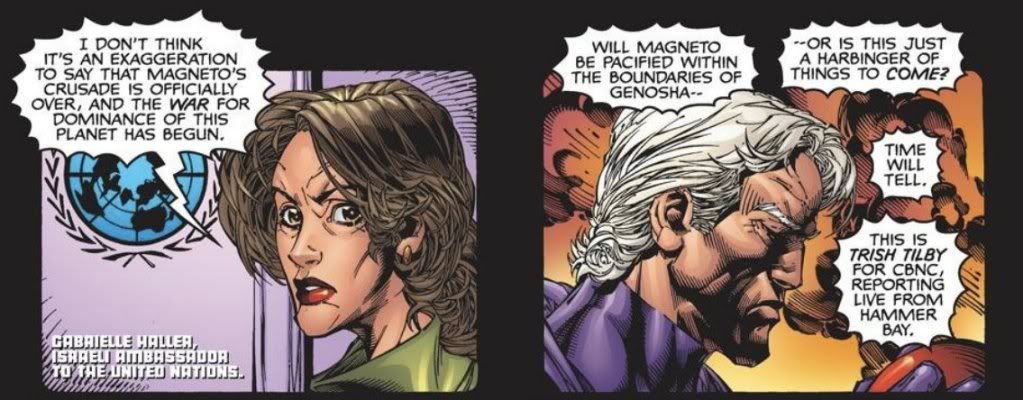
Gaby I don’t think it’s an exaggeration to say that Magneto’s crusade is officially over, and the war for the dominance of this planet has begun.
Reporter Will Magneto be pacified within the boundaries of Genosha --
--or is this just a harbinger of things to come?
Time will tell.
This is Trish Tilby for CBNC, reporting live from Hammer Bay.
(Magneto Rex #1)
Nowhere in Magneto Rex is it mentioned that she actually knew Magnus before he became a mutant terrorist. That’s not important in the context - she’s there as a diplomat, and her personal associations to Magneto is beside the point.
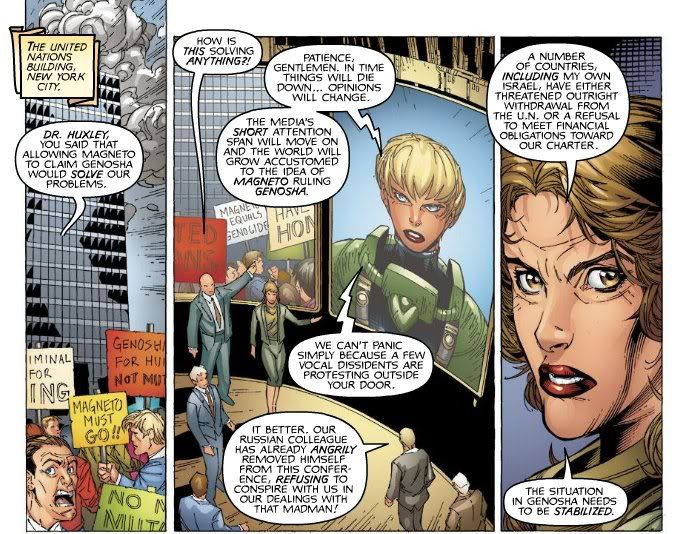
The United Nations building, New York City.
Some UN official Dr Huxley, you sad that allowing Magneto to claim Genosha would solve our problems.
How is this solving anything?!
Huxley Patience, gentlemen. In time things will die down... opinions will change.
The media’s short attention span will move on and the world will grow accustomed to the idea of Magneto ruling Genosha.
We can’t panic simply because a few vocal dissidents are protesting outside your door.
Another UN official It better. Our Russian colleague has already angrily removed himself form this conference, refusing to conspire with us in our dealings with that madman!
Gaby A number of countries, including my own Israel, have either threatened outright withdrawal from the U.N. or a refusal to meet financial obligations towards our charter.
The situation in Genosha needs to be stabilized.
(Magneto Rex #3)
(Later on in this issue, she’s referred to as Dr. Haller, which I assume means that somewhere along the way she got a Ph.D.)
It’s interesting that Gaby is shown to hold fairly common ‘human’ views about mutants, even if her son and two friends of her youth are mutants. However, all there are Omega mutants, of whom two are outright dangerous (Magneto and Legion) and the third is just generally manipulative (Xavier). Also, she’s not expressing her own views, but those of her country. Later on, in X-Force #17, she also turns up in the United Nations, and argues against the reintroduction of Sentinels, where she mentions “a few radical extremists” among mutants as the actual problem.
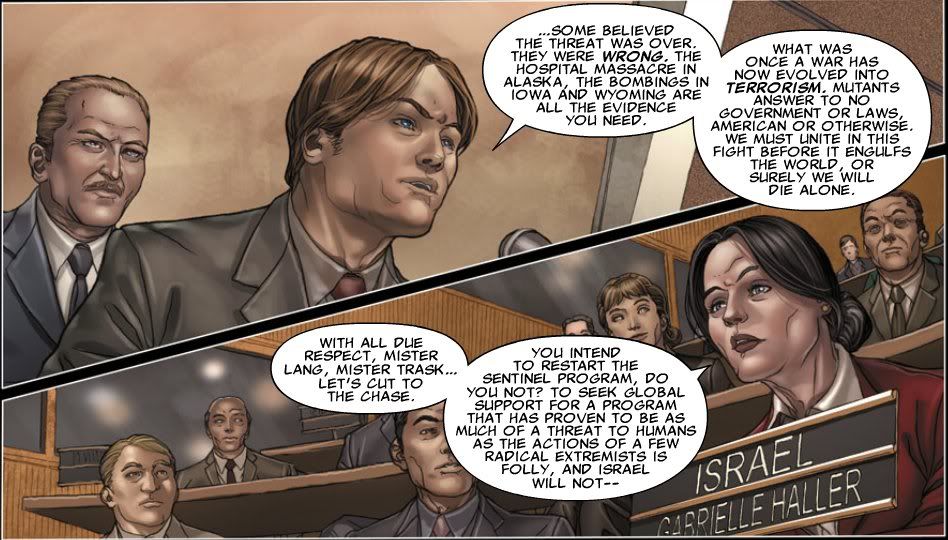
Trask ...Some believed the threat was over. They were wrong. The hospital massacre in Alaska, the bombings in Iowa and Wyoming are all the evidence you need.
What was once a war has now evolved into terrorism. Mutants answer to no government or laws, American or otherwise. We must unite in this fight before it engulfs the world, or surely we will die alone.
Gaby With all due respect, Mister Lang, Mister Trask... Let’s cut to the chase.
You intend to restart the Sentinel program, do you not? To seek global support for a problem that has prove to be as much of a threat to humans as the actions of a few radical extremists is folly, and Israel will not--
(X-Force #17)
Just the fact that Gaby turns up in these issues for one or two panels, but is clearly identified in that short time, makes it clear at least to me that this is a female character who is not bound up to the male characters she in one way or another is associated to. Parts of Gaby’s first appearance might be ignorantly written, but very quickly, she becomes an interesting, well-rounded character. She is not a mutant, and she has no special powers, but she is intelligent, passionate and ready to stand her ground. She has a tragic past, but it’s not constantly pushed into our face, and it does not overshadow her as a character. She has a both professional (in her diplomatic, political and legal work) and personal (especially in relation to her son) side, and these are allowed to coexist. In all these ways, Gabrielle Haller is an amazing character, and one of my Marvel all-time favourites.
Type Meta
Fandom Marvel (Uncanny X-Men, New Mutants)
Spoilers Issues discussed are Uncanny X-Men #161, 200, 320-321, X-Men #40-41, New Mutants #1, 26-29, Magneto Rex #1-3 and X-Force #14, but there are little to no spoilers for the overall plots, with the exception of New Mutants #26-29.
Warnings Some discussion of genocide and rape.
Characters Gabrielle Haller, Charles Xavier, David Haller, a bit of Magneto (for good measure).
Words 4345
Summary In which I explain why Gabrielle Haller is one of my favourite characters in the X-Men comics. Includes feminist rants, a little bit of slash-goggling and plenty of pictures, so if you’re on dial-up, beware. All bits of comics are transcribed.
Everyone gets defensive about their favourite character at some point or another. It happens to me from time to time, especially in reference to one specific character. It’s difficult to have a favourite Marvel character, as there are so many, but one character whom I’m especially fond of is Gabrielle Haller. She is really just a supporting character, but despite only turning up in a dozen-or-so issues, she is still a distinct, interesting character. I also find her a good example of a female supporting character, who is allowed her own personality despite her connections to (more prominent) male characters. She is also an interesting example of character development. When she first turns up, she is very much “the girl”, but Chris Claremont, who was writing at the time, keeps bringing her back and continues to consider various questions raised during her first appearance.

Before I start working my way through (most of) the issues where she appears, it seems only right to introduce her properly. Gabrielle Haller (also called Gaby - I’m going to call her that because it’s by far the easiest, even if it feels a little lacking in respect) is the Israeli ambassador to Britain, and later she is the ambassador to the United Nations. She is also active within politics (she is the Israeli foreign minister at one point) and has a degree in law. Originally, she is from Holland, but ended up in Israel after the Second World War. Her family died in the Holocaust. She survived, but retreated into a state of catatonia, which she only recovered from with the help of Charles Xavier. Gaby is also the mother of Xavier’s son David, who is a very powerful but mentally unstable mutant (and I’ll spend more time discussing their relationship below). One might think that this connection to one of the most prominent X-Men characters would reduce her to the role of ex-girlfriend and mother, but she also appears as a character in her own right.
Let’s start from the beginning. Gabrielle Haller first turns up in Uncanny X-Men #161, which is a flashback, probably to the 1960s. Xavier (young and still uninjured) has been travelling around the Mediterranean, brooding over the fact that Moira, whom he was engaged to, has broken up with him quite suddenly. In Uncanny X-Men #117, which narrates his adventures in Cairo, he says that he “went a little crazy”. The flashback of #161 starts with Xavier arriving to Haifa to help a friend of his, Daniel Shomron, with traumatised Holocaust survivors. Magneto (then known as Magnus) is a medical volunteer at the hospital. The first patient is Gabrielle Haller, who suffers from catatonic schizophrenia, shielding her completely from the world. Xavier attempts to help her telepathically. What follows is in my opinion one of the best-written telepathy sequences in the comics.

The light is pure, unbearable - - the face of the Gorgon, or perhaps of the Lord, or both -- yet he does not look away. He cannot.
He remembers a line from the Bhagavad-Gita -- “I am become Death, the Shatterer of Worlds.”
Then, the majestic radiance fades, imagines form, a voice is heard. It is Gabrielle, age 10.
Through her young, innocent eyes, he relives the war. He/she stands packed so tightly in a cattle car that the dead cannot fall, but remain on their feet, supported by those around them ‘til the cars are unloaded.
Her grandmother dies that way, by Gaby’s side.
The lucky ones are gassed, their bodies cremated. But Gaby is beautiful. The guards like her.
So, she survives, young in years, ancient in spirit, innocent no longer.
Was she wicked, evil, the child wonders, that she should be punished so? She thinks of suicide, but lacks the courage. She prays the guards will tire of her and send her to the gas chamber. But they never do.
Instead, in the last days of the war...
...She is dragged before the commandant, who points a magic wand at her, chants an obscene spell...
...and transforms her into solid gold.
(Uncanny X-Men #161)
In this sequence, Claremont manages to describe the workings of a child’s mind. The depiction of soldiers as monsters is not an attempt to dehumanise the perpetrators, but a way of underlining the subjective nature of the ten-year-old Gaby’s memories. This distance also lets Claremont be subtle about what precisely happens. This is not just for the sake of any younger readers (although I certainly wouldn’t put this sequence in the hands of a ten-year-old to read), but also about the Comics Code, which states that “rape shall never be shown or suggested”. In the 80s, the Comic Code was not followed quite as rigorously as before, and I’ve found nothing implying that this issue got into trouble. However, they would not have been able to get away with handling this bluntly, with or without a code to follow. (It’s been pointed out, for examples by our friends over at TV Tropes, that rape can sometimes be the default “tragic backstory” for female characters. I’d like to argue, though, that this is not such a case. When done badly, rape as a backstory is trivialised and then scooted to the side quickly, or it is sensationalised and (in the worst-case scenario) presented in an almost voyeuristic way. None of these things happen here. This is part of a greater trauma, and is certainly not trivialised. The distance the subjective narrative gives us takes away any sensationalism - indeed, I find that one sentence, “but Gaby is beautiful” absolutely horrifying. It is also something that in the historical context is plausible, horrific as that is. And, as we will see, it is nothing that comes to define Gaby as a character.
Moving on - after this telepathic sequence, Gaby is roused from her catatonic state and wakes up. She is still weak, but slowly starts putting herself together again. It is through helping her do that that Magnus and Xavier become friends (so if you feel like turning the idea of female characters being dependent on male ones, one could ask how Earth-616 (that is, the primary comic canon) would have looked if it were not for her).

Over the weeks that follow -- and with the aid of her constant companions, Xavier and Magnus -- Gaby bridges the gulf between child- and adulthood, her old life in Holland and her new one in Israel, with remarkable ease.
Together the three friends range throughout the ancient land, viewing all its myriad wonders...
...from the Galilee to divided Jersualem to the Negev Desert. During their travels, Xavier discovers in Magnus a fascinating, kindred spirit -- and when he outlines he nascent theories on human evolutionary mutation, Xavier is delighted to see that Magnus takes him seriously.
However, he also comes to realize that, in many ways, Magnus has been as deeply scarred by his experiences as Gaby.
Magnus Charles, you are an idealistic fool. If mutants exist, humanity will fear them and out of that fear, try to destroy them. There is only one way to guarantee the survival of homo superior, and that is for them to hold the reins of power.
(Uncanny X-Men #161)
(And I must admit that one of the reason why I added this sequence was that I think that the three of them are absolutely adorable together.)
After this montage of the three of them travelling around Israel, the turning-point in Gaby and Xavier’s relationship comes.

Xavier (Magnus is wrong. Such security cannot be imposed by fear from above. It must row from understanding...
Gaby Ahem!
Xavier Hmh? Oh, I’m sorry, Gaby. My mind was wandering.
Gaby Then I’ll have to use all my feminine wiles...
... to attract its attention.
Xavier (Ahhh, Gaby, you believe you’re in love with me.
But you aren’t. Not really. Na yet, your need to love and be loved... is as genuine, as great, as my own.)
Gaby I owe you everything, dear Charles. But I have no means of repaying you...
... save this.
Xavier (I should not do this. But if it makes us both happy and brings us the solace we seek...
...what then is the harm?)
(Uncanny X-Men #161)
What, indeed? Not only is Xavier breaking a convention so ancient that it is mentioned in the first Hippocratic Oath, namely that a doctor should not have any kind of sexual relations with a patient. He makes no attempt to reject the idea that she should ‘repay’ him, not even that she should do so with her body. Warning-bells should be going off here, Charley. Evidently, this is something Claremont did not consider at the time, or (quite possibly) did not have time to elaborate on (after these panels, the plot picks up again, and Gaby and Charles are not reunited until the very end of the issue, when Magnus leaves them to take up his fight against human hegemony). The issue about the morality of their relationship and the question of consent comes up several times later. In Legion Quest (Uncanny X-Men #320-321 and X-Men #40-41), Magnus expresses serious doubts about the propriety of it.

Haifa...
...The past.
Magnus (Charles, what are you getting yourself into?
You let the barriers between the doctor/patient relationship slip.
You let Gabrielle Haller fall in love with you. But who am I to criticize? Is it jealousy? That he has Gaby - - and each night I go to sleep and dream of my lost beloved, Magda?
Why would I deny Charles a chance at happiness just because I refuse to dream of a better world?)
(X-Men #40)
In this entire arc, the idea of mutation as a metaphor for homosexuality is constantly present - in X-Men #40, Magnus reflects on how he should confide in Charles, and thinks to himself: “Why is it that every time I look into that man’s eyes -- he makes me feel as though I’m guilty of something? Of what, though? You know the truth, Eric [sic]. Guilty of hiding. Of running away from the responsibilities you bear because you are different.” In the same issue, there is a mention of Xavier’s “suspicions about his friend Magnus” and that he might be like him. Even if both these mentions are references to mutations, neither of the statements need any altering to be about homosexuality. Slash-goggles are particularly difficult to prize off, and therefore this point is highly subjective, but I can’t resist reading Magnus’ worries over Xavier’s relationship with Gaby as being not so much because of jealousy of what he has, as what she does. But I digress.
However, later on when Xavier admits his worry that “ethical doctors don’t fall in love with their patients”, Magnus (despite his previous reservations, which still seem to linger, considering how grim he looks in these panels) encourages him, answering that “Gabrielle Haller isn’t a case file, Charles. She’s a marvelous woman, alive and radiant.” After mentioning that he knows what she must have lived through (an arguable point?), he continues:

Magnus I know the emptiness and loss she must have felt. She does not want to be alone in this world.
Xavier So if Gabrielle is my last chance at happiness...
Magnus ..You would be a fool to let her slip away. Life is short, Charles.
(Uncanny X-Men #321)
Here is the implication that Xavier’s motives aren’t precisely easy. If Gaby is simply his “last chance at happiness”, she is certainly not his first choice, and it is a chance that he seems to take almost dutifully. Neither Gaby nor Charles are the other’s great love. They are simply two people who in a specific situation, at a specific time, end up needing each other.
To return to the first kiss between Gaby and Xavier in #161, let us consider Xavier’s thoughts: “You believe you’re in love with me. But you aren’t. Not really.” To deal with two points first - Gaby has spent most of her life, and until very recently her entire adolescence and adulthood, withdrawn from the world. Her conception of adult relationships is bound to be a little patchy. Also, Xavier is a telepath. However, neither of these things change the fact that this is an incredibly infantilising comment. Who is he to tell her how she feels? But Xavier’s certainty that he knows what Gaby feels better than Gaby continues. I think this is a conscious decision on Claremont’s side (at least one formed after #161). The fact that he writes Gaby as arguing back shows that he has thought about it. However, Xavier is still very sanctimonious about it, and engages in what must be the opposite of slut-shaming. He is desperate to keep Gaby as a victim, arguing that what he did to her was essentially rape, even if she does not agree on that. It is an attempt to infantilise her, but also to take away her right of a sexuality of her own. This question is especially address in Excalibur #14, during a psychic battle when Xavier is separated from Doctor Strange and finds himself meeting Gaby.

Charles Gaby Haller - - as I remember you best!
Gaby My dear, sweet, Charles!
Charles No - - this is wrong!
Gaby I beg your pardon
Charles What a brilliant ploy. Trapping Stephen with his greatest foe --
-- and me with my greatest shame.
Gaby Is that what I a to you?
Charles I manipulated your emotions, Gaby.
When we met in Israel, I used telepathy to make you care for me.
Gaby To hurt me? To be cruel?
Charles God - - no!
Gaby Then why?
Charles I...
... I was alone. I was so lonely.
Gaby So was I.
The pain - - the need - - was mutual.
Charles I took advantage of you.
Gaby Give me a little credit. Charles, I survived the Nazi death camps. I have some strength of my own. I fought them. And if things were as you said, Charles, I’d have fought you!
(Excalibur #14)
The suggestion that Xavier actually manipulates her feelings rather than just overstep the boundary between doctor and patient does not quite make sense with the evidence provided in #161, but comic canon is not a clear-set thing. On the other hand, he might be lying, to make his guilt more perceptible (but his anger when Gaby implies that the confrontation is not only an illusion, which is so palpable that he raises a fist against her, implies that this is something he would not actually have told her). It is quite interesting that he keeps pushing the point that he is the one who essentially started their entire relationship and that he is to blame, and she tells him quite bluntly that he’s wrong. She refuses to be kept as a victim. Also, she refuses to accept Xavier’s fishing for sympathy. She is not afraid to stand up to him.
This question of blame is also addressed in Excalibur. Gaby asks Xavier whether he has ever manipulated someone the way he did with her.

Xavier Of course not!
Gaby Well, then. You made a mistake. So did I. We learned from that mistake.
Time to move on.
Xavier Does atonement count...
...When it’s in your dreams?
(Excalibur #14)
I won’t go into the main plot of #161, but will simply say that Gaby is central to it. At the end of the issue, Magneto takes off with some Nazi gold and Gaby regains her (once again lost) sanity, this time on her own, even if Xavier is part of it. The flashback ends with a kiss, and Gaby proclaiming, “it’s so wonderful to be alive!” After this, we hear nothing of her until twenty years later.
However, before moving onto that, it seems only fair to discuss Gaby’s cameo in What if Magneto had Founded the X-Men with Professor X?, which is based on the events at the end of #161. What really changes the course of history in this alternative version is that Gaby regained consciousness earlier and argues against Magneto, just after he has his falling-out with Xavier. As a Holocaust survivor, Gaby has some insight into what he has been through, but as a human, her perspective is also different. Magnus might be able to tell Xavier that he is wrong because he doesn’t know anything about real oppression, but he can’t say this to Gaby. The moment which changes it (and the moment which made me certain that I loved Gaby as a character) is this:

Gaby They gave ordinary people the license to commit evil and not be bothered...
...Because their “law” said we weren’t human. What happened to us didn’t matter because we were little more than garbage.
I am not garbage.
I am a person.
I am a human being.
I refuse to be debased by them, Erik.
I refuse to be debased by you.
(What if Magneto had Founded the X-Men with Professor X?)
Certainly not someone who is daunted by authority, considering that she is ready to argue against both Xavier and Magneto, both of whom are powerful mutants and physically big men. She has a very strong sense of right, and she’ll hold people to it.
A little confusingly, in this alternative universe Gaby ends up married to Magneto. I expect that this is actually a marriage of convenience, because I suppose having two bachelors founding a superhero group together must mean they’re gay... I think Marvel’s reluctance to let Jewish and non-Jewish characters marry (most obvious in the case of Magda and Magneto - this is one of the reasons why Marvel tried to retcon Magneto’s Jewish identity) is the reason why Magneto ends up marrying Xavier’s girlfriend. She doesn’t turn up after this scene, which I think is a pity, but the only way of somehow reading an attraction between them in this very short issue, is that Magneto is impressed by how she argues against him.
Back to canon chronology. Uncanny X-Men #161 was published in 1982. The next year, 1983, a new comic entitled New Mutants, about a new team of mutants (you wouldn’t have guessed, would you?) collected by Xavier. In the very first issue, Moira McTaggert is summoned to the Israeli Embassy in London, and who is the ambassador, if not Gabrielle Haller? This is certainly a big step since last time we saw her, but certainly not an insurmountable one. I’m not going to go into the slightly unrealistic features of this, such as that she is a politician and a diplomat, and all this with a history of psychosis, because bringing the concept of realism into Marvel just doesn’t work. After all, people shooting laser out of their eyes is not altogether realistic.
This quite short scene starts the story of Legion. After a while, it is revealed that Ambassador Haller has an autistic son, and she wants Moira to help him.

Gaby His autism is merely a symptom of something far more serious. The boy is a mutant. I believe his abilities are primarily psionic - telepathy, possibly telekinesis.
I have tried every means to help him, without success.
I turn to you as a last resort.
Moira I’m flattered. But my work is theoretical in nature, not practical. The person y’need is my colleague, Charles Xavier...
Gaby I want Charles kept out of this.
Moira Why, f’r Heaven’s sake? If y’know him...
...y’ also must realize tha’ he’s far better equipped than I t’deal wi’ this situation.
Gaby I have my reasons.
Moira An’ I’ve a right t’ hear them.
Gaby Very well -- since you insist.
Charles Xavier... is the boy’s father.
(New Mutants #1)
It’s interesting that despite all the male characters floating around here (David Haller, Xavier), the way Gaby is introduced is as the Israeli ambassador of Great Britain. This is a pretty powerful position, and that a woman holds it is particularly impressive. Women are still massively underrepresented in diplomacy, and this is written and set in the 1980s. Also, the big revelation here is not that Gaby is Xavier’s old girlfriend, but that Xavier has a son.
Legion is properly introduced in New Mutants #26-29, published in 1985. As this meta post is about Gabrielle Haller and not her son, I’m not going to go into depth and try not to spoil too much of the plot. Moira has tried everything she can think of to help David, and now she and Gaby have decided to call in Xavier. He comes to Muir Island along with the New Mutants. He has not met Gaby for almost twenty years. Their first proper conversation goes like this:

Muir Isle...
Gaby Your shoulders are hard as steel.
Xavier Not for long -- that feels marvelous.
You’ve done well with your life.
Gaby Ambassador today, maybe foreign minister tomorrow. After that, who knows?
Prime minister of Israel? I like the sound of that.
Xavier I, too. You never married.
Gaby I only met two men worth the commitment. One died, the other always had... other commitments.
Xavier It was criminal of me to take advantage of you.
You were my patient, Gaby, my power gave me access to every corner of your being. There is no greater trust -- especially since it was not freely given, I forced myself into your mind -- and I abused it.
Gaby Nonsense. We both found a comfort we desperately needed in each other’s arms. However guilty you may feel, Charles, I have no regrets.
Xavier A telepath can play God. You’ve no idea how tempting that is. I can change thoughts, twist memories, destroy a personality -- erase it utterly -- and recreate it any way I choose. I tell myself I use my ability solely to do good -- only to remind myself that my arch-rival Magneto uses those same words to justify his actions.
Gaby When I first understood what you did -- and could do -- I became terrified of you. I asked myself if my thoughts, my feelings, were my own or phantoms you’d placed there.
That’s one reason why I never wrote after you returned to America. I told myself that it was wrong to believe so, that you were an honourable man, that you’d never do such things -- but the doubts remained. I couldn’t help myself.
I don’t know that answer, Charles, and I don’t care. I’m fighting for the life of my child, I’ll face down the Devil himself if I have to. He has powers like yours and he’s using them to hurt people.
Moira told me of her mad mutant son, Proteus, and of how the X-Men and she were forced to slay him. I don’t that fate for David.
Xavier If there’s a way, Gaby -- if there’s any hope at all -- I’ll find it.
Now tell me all about him -- especially the trauma that made him autistic.
One thing I find Claremont writes particularly well is the way ex-lovers interact. These people know each other well, and there is an intimacy, both in the way they speak and in the way they happily touch. However, they do not fall into each other’s arms. Never in the interaction between these two set after that twenty-year gap is there any romantic tension between them, which to me feels very realistic. I’m also very fond of this scene because of how well-balanced the conversation is. It is not the man talking at the woman, as some conversations in comics are. In fact, Gaby more or less presents more personality traits on this one page than in the whole of Uncanny X-Men #161. First and foremost, she’s presented as a person with a diplomatic and political career. Only after that does the conversation move onto her marital status and their past relationship. The way she admits her fears about the possibility that Xavier has manipulated her, and her fierce worry for David, makes the portrait incredibly human.
Xavier’s claims that what he did to her was “criminal” is probably the inspiration of their discussion in Excalibur #14, with the difference that in that, he admits to having manipulated Gaby’s feelings, which he does not say or even imply here. Claremont diverges from in some other respects from the canon he’s set up in this issue. He adds as a reason why Gaby did not get in touch with Xavier after David’s birth when she heard that he had been paralysed, which, despite certainly being ableist, is something which feels very correct for the time-period. Claremont also attempts to change some details, specifically that Gaby is actually not single but married Daniel Shomron, a friend of Xavier and another of her doctors, who is the man she mentions who died. I don’t really see why Claremont introduces this. I’d like to think it’s a concession to how difficult a diplomatic career would have been for an unmarried single mother in the 60s-70s, or possibly so that Gaby gets to have a bit of a sex life after her silly American boyfriend leaves, but it might be that, well, Gaby’s a woman, Dan’s a man, they’re friends, then they should be married. (Considering that this is in direct contradiction to what’s said in New Mutants, I personally prefer to turn a blind eye on it.)
Back on Muir Island, nothing goes as planned, of course. Gaby doesn’t tell Xavier “everything”, especially not that he is in fact his son (because apparently it’s possible to be a prominent geneticist and a brilliant scientist, and still not be able to count someone’s age minus nine months and realise that he was in a relationship with said person’s mother at that time). Before Xavier can help David in any way, he, the New Mutants, Moira and Gaby all get sucked into David’s mindscape, where David has sealed himself off and his multiple personalities control one mutant power each; the American adventurer Jack Wayne is telekinetic, the tomboy Cyndi controls fire and the young Palestinian Jemail (whom Gaby refers to as “the Arab”) is telepathic.
Finally, Gaby is forced to explain (after Dany, the leader of the New Mutants, has thrown a tantrum at her):

Dany If you’d leveled with Professor Xavier from the start -- instead of lying like you did -- maybe we wouldn’t be in this fix!
Gaby Don’t take that tone with me, young lady, you’ve o right to judge. But I’ve o more right to hide, much as I want to.
David... was the only survivor of a terrorist ambush in Paris. I always suspected -- because Charles was his father -- that my son was a mutant. He must have used his powers to kill his attackers. That Arab was the assassin’s leader.
Moira David’s a high-order psi, potentially as formidable a telepath as Charles. It isn’t beyond the realm of possibility for him -- in the chaos of a panic catalyst manifestation of these abilities, too much and far too soon -- to have absorbed the psyche of the life he was taking. In the process, the Arab must have absorbed the talent that destroyed him.
Gaby That’s obscene!
Moira It’s the only explanation.
Cyndi Hey, ladydoc, Jack says we crack Daveydomeboy loose, we croak -- that straight?
Moira I dinna know, Cyndi. It’s been so long, you splinter personalities may have become too strong.
(New Mutants #28)
Jemail is the most important of the personalities, and he also adds a political side to the story. For most of the story, the reader and the characters are lead to believe that he, who attempted to kill David, is the villain. Especially Gaby is convinced of this, so much that she several times tries to attack him, and when she finally experiences David’s memories of the terrorist attack, she does attack him.

...And Jemail’s assassination team...
...come to kill every Israeli they could find.
Daniel died immediately, and David would have...
...had his terror not catalyzed his latent psi-powers.
In a split-second, David incinerated the brains of his would-be murderers. But as he did, he also -- for that instant -- merged minds with each of his victims, actually became them, felt their thoughts and emotions, at the moment of their deaths.
That was the trauma which shattered his own psyche - a gentle, loving boy forced suddenly to kill -- and into that void was sucked Jemail, slain yet immediately reborn.
Jack Wayne Kill him, Gaby! It’s what you want -- what he deserves -- kill the Arab!
Gaby Filthy, stinking animal -- may God rot your butcher’s soul!
Xavier Gaby, no!
You mustn’t do this!
Gaby Let me go!
Xavier Nobody kills, nobody dies, do you hear me?
Nobody!
Gaby Charles - behind you!”
(New Mutants #29)
This is an altogether more unpleasant side of Gaby, which we have not seen before, but which I think is incredibly important to her character. There is the risk that alongside Magneto, Gaby becomes “the survivor who got it right”, as she seems in the What if...? issue she appears in. Instead, she also harbours irrational (but common) hatreds, while at the same time, she is ready to resort to violence to protect or avenge people she loves.
Events take an unexpected turn, when it turns out that Jemail is not at all trying to splinter David’s mind, but instead put it back together again. He explains how he has been taught to hate Israelis, but when he finds himself possessing David’d telepathic abilities, his host’s mind is the first he reads. “I learned how kind and gentle and innocent a soul he was”, Jemail explains. “Then, I explored his mother’s thoughts, and those of others, and with that knowledge came an understanding, a growing enlightenment of spirit that my hatred could not withstand.” This is an enlightenment which spreads to Gaby while he speaks:

Jemail So, I resolved to put things right. David’s psyche had splintered into scores of psi-selves and I began collecting and re-integrating them into the core self. Some resisted and one in particular proved dangerously hostile.
(New Mutants #29)
This is one of my favourite comic panels in any categories, because it manages to capture something going on which is not being spoken. The look on Gaby’s face is one of guilt and humility, but also tenderness. Her hand is half stretched out, as if she instinctively wants to touch Jemail, now that she realises that he has tried to protect her son, not harm him - in some way he has become her son, as David himself is unreachable - even if she self-consciously seems to stop herself. In some small way, these two characters resolve their hate for one another, which is symbolic for the hopeful outcome of the Israel/Palestine conflict.
Finally, Gaby and the others manage to get out of David’s mind, but are unable to heal it, and his multiple personalities are the only way to communicate with him. The issue ends with another tender moment between his parents:

Xavier David is much better, Gaby, but he isn’t cured.
Gaby And you doubt he ever will be, is that it?!
Xavier I don’t know. You saw his mindscape -- Jemail didn’t cause that, his memories memory provided elements of the stage settings and props, David wrote the script.
Deep down inside, he’s still confused and hurt and angry. He’s a boy growing up in a man’s body, twice his age. He knew he had a father, yet that father seemingly abandoned him and his mother. And later, when he needed his mother the most, to save his life, she wasn’t there. Primal losses -- and failures -- prompting equally primal responses.
Cyndi described it best -- remember, she’s but a reflection of the boy himself -- “they say that they love you, but when it’s a choice between your lives or theirs, you get the chop every time.”
Gaby My fault, then. My failures. My mistakes.
Xavier Mine, too. I had a hand in his creation.
But guilt does none of us any good. The past is done,Gaby, we must look to the future and try to make it as bright as can be.
Gaby Can you help him?
Xavier I can try.
(New Mutants #29)
It would be very easy for the narrator and the characters to put all the blame on Gaby, in the way that mental issues are often blamed on mothers. Instead, Claremont makes it more complicated. His father carries some of the blame, as does the situation. David becomes an extension of his parents’ mistakes and traumas (it must be a conscious decision that both Gaby and David suffer from severe traumas prompted by anti-Semitism when they’re ten years old and both react by becoming catatonic). Legion returns several times, most prominently in the prelude to Age of Apocalypse, and even if it would be possible to read him simply as ‘evil’, he rather seems like a deeply tragic character, who is shaped by circumstances, not bad parenting.
New Mutants #29, the last issue in this story arc, was published in July 1985. In December the same year, Uncanny X-Men #200, entitled “Trial of Magneto”, came out. The background is that Magneto, who has gone good, has been arrested, and stands trial in Paris on charges of crimes against humanity. I don’t think you’ll be surprised at who’s the defense.

Prosecuting the case is England’s attorney-general...
....Sir James Jaspers.
defense counsel is Israel’s ambassador to Britain, Gabrielle Haller, assisted by American scholar and educator -- one of the foremost experts in human genetic mutation -- Charles Xavier.
(Uncanny X-Men #200)
She’s a multitalented lady. One of the many brilliant things with this issue is that she is only there in the capacity of Magneto’s lawyer. She is never reduced to Xavier’s ex-girlfriend. There is not even any mention of David in this. However, she is still given a lot of personality.
(And as you might have gathered from the artwork by now, Gaby is a chain-smoker. It was fine to smoke in court in the 80s, I guess.)
As this is the kind of issue which makes me jump at people and should ‘you must read it!’, I’m not going to give too much away. However, I give you some of my favourite moments.

Gaby Regarding the specifics of the indictment, I move that all counts pertaining to incidents that occurred prior to Magneto’s confrontation with Mutant Alpha at the United nations be struck...
Woman in audience TRAITOR!
Jewess, you’ve sold out your own kin! You deserve the same fate as him!
Xavier Gaby...?
Gaby Merely thinking -- sadly -- Charles: “Plus ca [sic] change, plus ca [sic] meme chose.”
“The more things change, the more they stay the same. Some old hatreds never seem to die.”
(Uncanny X-Men #200)
In many ways, this is a quite sad moment, considering the mere fact that anyone would still shout something like that at her, and that she bears it so stoically. Then again, she’s taught herself not to let it get to her. It’s certainly an event which fits in the subject of this issue and the X-Men in general, namely prejudice and oppression. It recurs later, when she, Xavier and Kitty Pryde get attacked by the protestors outside the court, when she is attacked not just for being Jewish but also for being a woman. (Pointed brackets is Marvel’s way of showing that something is in another language than English.)

Protestors < There! That’s the slut who’s defending the monster! >
< Shame, woman! >
< Get out of France, mutie-lovers! We don’t want your kind here! >
< Foreigners! Go back where you came from! >
Kitty Take my hands, both of you! I’ll phase us all, so we don’t get hit!
Gaby You know, Charles -- I have the sad feeling that if, by some miracle, I win Magneto’s acquittal...
...that mob will go berserk and tear him apart.
Along... along with his lawyer.
Kitty Lousy -- rotten -- stinking--!
I’ve never been so angry!
(Or so scared!)
How can people be so cruel?!
Gaby A mob isn’t people, Kitty. It’s perhaps the wildest of animals.
Kitty This can’t go on. The X-Men -- and mutant-kind -- are on trial as well as Magneto! We’ve got to find the creeps behind these attacks --
---prove our innocence, in public --
--but what’s the point?! It’s probably already too late.
Gaby It’s easy to run away -- or give up, as my parents did. They were lucky. They died in Bergen-Belsen.
For them, the pain ended quickly They’ve no memories to haunt them, no more fears.
But we who survived have a duty to make certain the Holocaust never happens again, to anyone! We must fight, Kitty -- we may be defeated, but we must never surrender.
(Uncanny X-Men #200)
Gabrielle Haller has turned up several times since this, primarily in Legion Quest (and X-Factor #108-109, set just before this arc) where Legion plays an important role. By virtue of her status as a diplomat and politician, she’s there both as David’s mother and as someone in a position of authority. For example, when the army is considering dropping a nuclear bomb on Legion to stop him, she makes pretty clear that she is not letting that happening:

Gaby He
is
my
son.
He is not well. And we will do anything within our power to bring him under control
Is that understood?
Hessen ...
Fully.
(Uncanny X-Men #320)
She also turns up several times in later issues, in which she is Israel’s ambassador to the United Nations. In Magneto Rex, a three-issue comic published in 1999, she turns up in all three issues. In the first issue, she and several others, for example Captain America and Moira McTaggert, are interviewed about the situation in Genosha, a country that Magneto has claimed as a mutant homeland.

Gaby I don’t think it’s an exaggeration to say that Magneto’s crusade is officially over, and the war for the dominance of this planet has begun.
Reporter Will Magneto be pacified within the boundaries of Genosha --
--or is this just a harbinger of things to come?
Time will tell.
This is Trish Tilby for CBNC, reporting live from Hammer Bay.
(Magneto Rex #1)
Nowhere in Magneto Rex is it mentioned that she actually knew Magnus before he became a mutant terrorist. That’s not important in the context - she’s there as a diplomat, and her personal associations to Magneto is beside the point.

The United Nations building, New York City.
Some UN official Dr Huxley, you sad that allowing Magneto to claim Genosha would solve our problems.
How is this solving anything?!
Huxley Patience, gentlemen. In time things will die down... opinions will change.
The media’s short attention span will move on and the world will grow accustomed to the idea of Magneto ruling Genosha.
We can’t panic simply because a few vocal dissidents are protesting outside your door.
Another UN official It better. Our Russian colleague has already angrily removed himself form this conference, refusing to conspire with us in our dealings with that madman!
Gaby A number of countries, including my own Israel, have either threatened outright withdrawal from the U.N. or a refusal to meet financial obligations towards our charter.
The situation in Genosha needs to be stabilized.
(Magneto Rex #3)
(Later on in this issue, she’s referred to as Dr. Haller, which I assume means that somewhere along the way she got a Ph.D.)
It’s interesting that Gaby is shown to hold fairly common ‘human’ views about mutants, even if her son and two friends of her youth are mutants. However, all there are Omega mutants, of whom two are outright dangerous (Magneto and Legion) and the third is just generally manipulative (Xavier). Also, she’s not expressing her own views, but those of her country. Later on, in X-Force #17, she also turns up in the United Nations, and argues against the reintroduction of Sentinels, where she mentions “a few radical extremists” among mutants as the actual problem.

Trask ...Some believed the threat was over. They were wrong. The hospital massacre in Alaska, the bombings in Iowa and Wyoming are all the evidence you need.
What was once a war has now evolved into terrorism. Mutants answer to no government or laws, American or otherwise. We must unite in this fight before it engulfs the world, or surely we will die alone.
Gaby With all due respect, Mister Lang, Mister Trask... Let’s cut to the chase.
You intend to restart the Sentinel program, do you not? To seek global support for a problem that has prove to be as much of a threat to humans as the actions of a few radical extremists is folly, and Israel will not--
(X-Force #17)
Just the fact that Gaby turns up in these issues for one or two panels, but is clearly identified in that short time, makes it clear at least to me that this is a female character who is not bound up to the male characters she in one way or another is associated to. Parts of Gaby’s first appearance might be ignorantly written, but very quickly, she becomes an interesting, well-rounded character. She is not a mutant, and she has no special powers, but she is intelligent, passionate and ready to stand her ground. She has a tragic past, but it’s not constantly pushed into our face, and it does not overshadow her as a character. She has a both professional (in her diplomatic, political and legal work) and personal (especially in relation to her son) side, and these are allowed to coexist. In all these ways, Gabrielle Haller is an amazing character, and one of my Marvel all-time favourites.